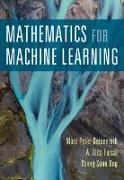RésuméThe fundamental mathematical tools needed to understand machine learning include linear algebra, analytic geometry, matrix decompositions, vector calculus, optimization, probability and statistics. These topics are traditionally taught in disparate courses, making it hard for data science or computer science students, or professionals, to efficiently learn the mathematics. This self-contained textbook bridges the gap between mathematical and machine learning texts, introducing the mathematical concepts with a minimum of prerequisites. It uses these concepts to derive four central machine learning methods: linear regression, principal component analysis, Gaussian mixture models and support vector machines. For students and others with a mathematical background, these derivations provide a starting point to machine learning texts. For those learning the mathematics for the first time, the methods help build intuition and practical experience with applying mathematical concepts. Every chapter includes worked examples and exercises to test understanding. Programming tutorials are offered on the book's web site.
Texte supplémentaire'The field of machine learning has grown dramatically in recent years, with an increasingly impressive spectrum of successful applications. This comprehensive text covers the key mathematical concepts that underpin modern machine learning, with a focus on linear algebra, calculus, and probability theory. It will prove valuable both as a tutorial for newcomers to the field, and as a reference text for machine learning researchers and engineers.' Christopher Bishop, Microsoft Research Cambridge
RésuméThis self-contained textbook introduces all the relevant mathematical concepts needed to understand and use machine learning methods, with a minimum of prerequisites. Topics include linear algebra, analytic geometry, matrix decompositions, vector calculus, optimization, probability and statistics.

